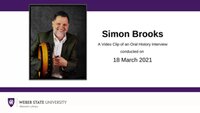| Title |
Brooks, Simon OH26_008 |
| Creator |
Weber State University, Stewart Library: Oral History Program |
| Contributors |
Brooks, Simon, Interviewee; Thompson, Michael, Interviewer and Video Technician |
| Collection Name |
Storytelling Festival Oral Histories |
| Description |
The WSU Storytelling Festival was implemented by the Friends of the Stewart Library in 1992. The library sponsored and managed the annual festival until 1998, when the festival was moved to the Department of Teacher Education, with the Library continuing as a sponsor. The three-day festival entails storytellers from all over the nation, including youth storytellers. The events are made up of workshops and presentations, a fund-raising banquet, and a wrap-up of wonderful stories from gifted performers. |
| Abstract |
The following is an oral history interview with Simon Brooks, conducted on March 18, 2021, via Zoom Communications Platform, by Michael Thompson. Simon discusses his life, his storytelling career, and his experiences as a professional storyteller during the Weber State University Storytelling Festival.; The following is a video clip of an oral history interview with Simon Brooks, conducted on March 18, 2021. In this video clip, Simon discusses the qualities of a good storyteller and why those qualities are important to the art of storytelling. |
| Image Captions |
Simon Brooks February 2022; Simon Brooks discussing the qualities of a good storyteller |
| Subject |
Storytelling; Storytelling festivals; Digital Storytelling; Storytelling--United States; COVID-19 Pandemic, 2020- |
| Keywords |
Professional storytellers; Audience; Performing; Virtual Storytelling |
| Digital Publisher |
Stewart Library, Weber State University, Ogden, Utah, USA |
| Date |
2021 |
| Temporal Coverage |
2021 |
| Medium |
oral histories (literary genre) |
| Spatial Coverage |
Ogden, Weber, Utah, United States, https://sws.geonames.org/5779206, 41.223, -111.97383; Hastings, Hastings, District, East Sussex, England, United Kingdom, https://sws.geonames.org/2647356, 50.85519, 0.57292 |
| Type |
Text; Image/StillImage; Image/MovingImage |
| Access Extent |
18 page PDF; Video clip is an mp4 file, 95.5 MB |
| Conversion Specifications |
Filmed and recorded using Zoom Communications platform. Transcribed using otranscribe.com. |
| Language |
eng |
| Rights |
Materials may be used for non-profit and educational purposes, please credit University Archives; Weber State University; Background music for the opening of the video clip was downloaded from https://uppbeat.io/t/sky-toes/the-long-ride-home; License Code SHMYB9XWFGM8KLVU; Background music for the closing of the video clip was downloaded from https://uppbeat.io/t/yeti-music/gentle-breeze; License Code IWGKRYG7XHQOMZY0 |
| Source |
Brooks, Simon OH26_008 Weber State University Archives |
| Format |
application/pdf; video/mp4 |
| ARK |
ark:/87278/s6sbpb3c |
| Setname |
wsu_sf |
| ID |
111930 |
| Reference URL |
https://digital.weber.edu/ark:/87278/s6sbpb3c |
| Title |
Brooks, Simon OH26_008 |
| Creator |
Weber State University, Stewart Library: Oral History Program |
| Contributors |
Brooks, Simon, Interviewee; Thompson, Michael, Interviewer and Video Technician |
| Description |
The WSU Storytelling Festival was implemented by the Friends of the Stewart Library in 1992. The library sponsored and managed the annual festival until 1998, when the festival was moved to the Department of Teacher Education, with the Library continuing as a sponsor. The three-day festival entails storytellers from all over the nation, including youth storytellers. The events are made up of workshops and presentations, a fund-raising banquet, and a wrap-up of wonderful stories from gifted performers. |
| Abstract |
The following is an oral history interview with Simon Brooks, conducted on March 18, 2021, via Zoom Communications Platform, by Michael Thompson. Simon discusses his life, his storytelling career, and his experiences as a professional storyteller during the Weber State University Storytelling Festival. |
| Image Captions |
Simon Brooks February 2022 |
| Subject |
Storytelling; Storytelling festivals; Digital Storytelling; Storytelling--United States; COVID-19 Pandemic, 2020- |
| Keywords |
Professional storytellers; Audience; Performing; Virtual Storytelling |
| Digital Publisher |
Stewart Library, Weber State University, Ogden, Utah, USA |
| Temporal Coverage |
2021 |
| Medium |
oral histories (literary genre) |
| Spatial Coverage |
Ogden, Weber, Utah, United States, https://sws.geonames.org/5779206, 41.223, -111.97383; Hastings, Hastings, District, East Sussex, England, United Kingdom, https://sws.geonames.org/2647356, 50.85519, 0.57292 |
| Type |
Text; Image/StillImage |
| Access Extent |
18 page PDF |
| Language |
eng |
| Rights |
Materials may be used for non-profit and educational purposes, please credit University Archives; Weber State University |
| Source |
Brooks, Simon OH26_008 Weber State University Archives |
| Format |
application/pdf |
| Setname |
wsu_sf |
| ID |
111982 |
| Reference URL |
https://digital.weber.edu/ark:/87278/s6sbpb3c/111982 |





